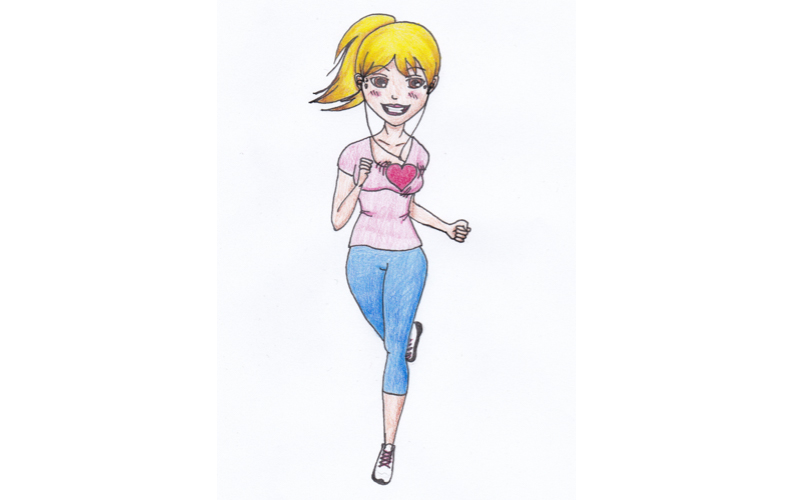Exercise Makes You Happy and Healthy
Physically active for good health
Are you as active as you’d like to be? Lots of people aren’t – in fact, around the world, the amount of physical activity we do is dropping all the time. The World Health Organisation (WHO) is so worried about our low activity levels that, for the first time ever, it is looking at ways to deal specifically with this problem with its “Physical Activity Strategy for the WHO European Region.”
Regular physical activity makes your life longer and healthier. The chance of getting medical conditions like heart disease, breast cancer, colon cancer, diabetes, and osteoporosis can all be reduced by being more physically active.
We all know we should aim to be more active. Interestingly, Switzerland is generally more active than many other countries. The most recent Swiss Health Survey found that half the population do physical activities such as sport several times a week, and around a third of the population do fitness-related activities once per week.
What is physical activity?
Many people think that “proper” exercise means planned activities such as an aerobics class, a session at the gym, or a swim fitted into your lunchtime break. But physical activity is anything that gets your muscles working to burn up energy. This includes all the moving, walking, carrying, stair climbing, housework, buggy pushing, etc. that you do in a typical day.
For those who don’t have the time (or money) for structured sports or gym sessions, or just don’t like scheduled exercise, it is still possible to fit lots of physical activities into everyday life.
The most important factor is to avoid sitting too much. Long periods of time where your muscles are not being used (e.g., sitting at a computer for several hours a day) lead to measurable poor health. The WHO has calculated that not being physically active causes up to 10% of worldwide cases of heart disease, diabetes, and breast and colon cancers.
How active is active enough?
In a nutshell, 150 minutes of moderate physical activity each week is needed to significantly reduce your risk of heart disease. Moderate means activity that makes you breathe faster, increases your heart rate and also makes you feel warmer and a bit sweaty. For convenience, you can think of this as 30 minutes of exercise five days a week. For those who are daunted by 30-minute blocks, moderate physical activity in 10-minute chunks is also good.
150 minutes per week? That’s not much! Or, that’s too much – depending on your view.
If you are new to physical activity, begin at a low level of intensity. Start with a short, gentle walk three times a week, aiming to increase the number of minutes you walk as you progress. Once you can manage three 30-minute walks per week (and it is surprising how fast this will happen once you start walking regularly), you should try increasing the intensity of your walk, e.g., by walking uphill or by walking faster. Even beginners should eventually aim to get up to a moderate level of physical activity (i.e., getting breathless, feeling your heart beating faster, and feeling warmer) in order to improve heart health. As your fitness improves, getting up to 150 minutes per week of moderate exercise is definitely achievable.
For those not new to exercise, you should try to fit in physical activity at least five times a week, and you can aim to include more vigorously intensive activity – that’s the type of exercise that makes you breathe hard, gives you a fast heart rate, and makes it difficult to keep a conversation going.
Benefits of exercise
All physical activity is beneficial. Regular moderate physical activity (the recommended 150 minutes per week mentioned above) is needed to improve your heart health (cardiovascular fitness). Gentle strolls alone will not improve your heart health, but exercise has other benefits too.
Exercise improves your balance, coordination, flexibility and mobility. Regular exercise means you are less likely to be stiff and less likely to get injuries. It helps maintain a healthy weight. Regular exercise is associated with less decline in cognition (brain function) as we get older. It improves bone density and helps prevent osteoporosis. It can help with back pain and joint strength, reduce stress, reduce obesity, and make you feel more confident in yourself.
Exercise can also help those who already have medical conditions – it is an important part of heart rehabilitation programmes for people recovering from heart surgery or a heart attack. People with chronic obstructive pulmonary disease, a serious lung condition, have been shown to have fewer hospital admissions and a lower risk of death if they exercise regularly.
Exercise and mental wellness
There is a lot of interest in the effects of regular exercise on depression and other mood conditions. Results from studies so far are mixed. In general, exercise seems to have some beneficial effects on depression for those with milder symptoms. However, in people (often with more severe symptoms) who have depression and are already on drug treatment and psychological treatment, the addition of exercise does not seem to make a significant difference. But for those with milder depressive symptoms who want to exercise, regular physical activity can improve mental wellbeing.
For those with other mood conditions such as schizophrenia, bipolar disorder, etc., exercise is useful for helping to maintain wellbeing in some people while they are stable, but medication and other therapies tend to have a more prominent role.
All the benefits of exercise, such as improving cardiovascular fitness, apply to everyone, whether they have a known mental illness or not, so we should all include regular physical activity in our lives.
Does doing regular physical activity prevent the development of mental illness? The picture is mixed – you will find some studies that show that regular physical exercise does lower the risk of developing depression, but others studies show no real link. Animal experiments have shown increases in “happy” hormones such as serotonin and endorphins when test animals increase their physical activity. It is tempting to apply this directly to humans, but as yet we don’t know for sure. What we do know is that people who exercise regularly say it improves their feelings of wellbeing, helps them sleep better, and increases self-confidence and positive thinking – all brilliant reasons to get more active.
A happy and healthy life
When Switzerland topped the list in the World Happiness Report in 2015 , I found myself wondering how the happiness of an entire country could possibly be measured. It turns out that there are an enormous number of factors that make up happiness, including something called “healthy life expectancy,” which is a measure that looks at how long a person is expected to live in good health. Switzerland has one of the best levels of healthy life expectancy in the world. I can’t help thinking that being more physically active is a key factor in extending healthy life expectancy here in Switzerland!
Get active! Here are some ideas.
- Choose something you like such as hiking, swimming, cycling, dancing, yoga, tennis, jogging, walking, or rollerblading.
- Enjoy your chosen activity alone, with family, or with friends.
- Listen to music while you exercise indoors, or go outside and tune your ear into the sounds around you.
- Introduce regular family fun by taking a small ball or a Frisbee with you whenever you go out.
- Think about physical games from your childhood. Chalk a hopscotch grid onto the pavement outside and get hopping. Find a rope or length of cord and remind yourself of old playground skipping games. Don’t forget Twister – a physical game which reminds me of my own childhood! Hula hoops are also worth considering.
- Keep a diary if you wish. This can be motivating and records your progress and future plans.
- Walk all short journeys, use public transport for longer journeys, and avoid car journeys.
- Offer to walk a friend’s dog regularly.
- Avoid lifts and escalators and use the stairs when you can.
- Get off the tram, metro, or bus one stop earlier and walk the rest of the way.
- Get a cheap pedometer (or use a free phone app) to count your daily steps (10,000 steps per day is recommended). People using an app to keep track of their steps walk more steps than those who don’t count their steps.
- Meet friends and go for a walk rather than meet for a coffee.
- Join a local activity group, e.g., Nordic walking
- If you are an adult and can’t swim, look for adult learner classes – many places offer these courses. If you can swim but haven’t done so in ages, look for adult improver lessons to improve your technique and swimming fitness.
- If you are an adult and need help with learning to ride a bike, Pro-Velo can advise on local courses as well as bicycle safety.
- If you enjoy walking and exploring Switzerland and you like phone apps, then the Switzerland Tourism-associated website Hiking in Switzerland has lots of interesting hiking routes around the country and is in English. Their free app Switzerland Mobility App is also useful.
- Look out for active events for the whole family, such as “Slow Up” days and fun runs like the Color Run.
- Avoid sitting for hours at a time!
By Dr. Jahura Hossain
Born and brought up in London, Jahura is a U.K.-qualified doctor. She has worked in hospitals, general practice, public health, prison medicine, and the pharmaceutical industry.
Illustration by Lara Friedrich
Lara has been a freelance illustrator for Mothering Matters since early 2013. She is in her second year of University where she’s currently working as an assistant in a research project in pedagogy. Lara is also an assistant translator from German to English for various fiction books, as well as being a demo singer for the songwriter Kate Northrop.
© Copyright. Jahura Hossain. 2016. All rights reserved. No part of this article may be reproduced without the express consent of the author.




